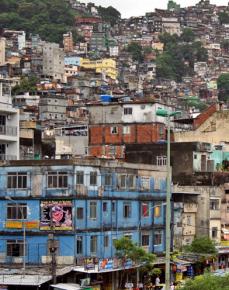Bulldozing favelas for FIFA
As the World Cup tournament comes to a close, Brazil's poor will continue to suffer the consequences, writes Independent columnist .
ONE REASON why the match between the U.S. and Belgium was so marvelous was how it confused us, as millions of people found themselves backing the Americans as underdogs. "Come on you plucky little superpower," we shouted. "Don't be bullied by huge bullying Belgium."
Occasionally, I'd come to my senses, such as when Clint Dempsey fired a shot into the stands, and I'd remember the Pentagon would report this as a smart kick that hit the center of its target.
And there was one tiny incident, barely noticed, when a fan ran out on the pitch. "Oh dear, there's an idiot," said the commentators, one of them chuckling. "He won't enjoy himself much in a Brazilian prison."
I half expected them to carry on, "Ha ha, no, he won't be able to run like that once he's had a series of medieval instruments clamped to his genitals." And "Absolutely, Ron, say what you will about South American police methods, at least you know someone who shows off like that will be getting 2,000 volts up the arse."
But this wasn't a drunk fan winning a bet with his mates. It was Mario Ferri, a protester wearing a shirt that said, "Save favelas children." Favelas are the Brazilian shantytowns, such as Vila Autodromo, opposite the Maracanã stadium in Rio.

In some ways, FIFA and the Brazilian government love the favelas, as they can be used for an image of a country where football is the game of the common people. So they've made hundreds of clips of kids with no shoes playing in the street, and smiling while saying, "We have much huge rat, but this is good, for we nail them together to use for goalpost. And when drug dealer is murder, is good also, for police draw outline of body on floor, which is handy for center circle."
BUT THEY'RE less keen on the actual real-life favelas. In some areas, a wall has been built between the stadiums and the nearby favelas so they can't be seen. Because no one wants the common people's World Cup spoiled by the unsightly spectacle of common people. Maybe FIFA should have been even more careful, and insisted that the government build walls around individual people, if they couldn't be bothered to make themselves look glamorous enough while the World Cup is on, especially during the knockout stage.
With hindsight, it might have been best to hold the competition in a specially designed Brazil, in a studio in Los Angeles. Then models could play the poor, and top architects could design fashionable slums that would look so much more authentic than the ones in Brazil.
Instead, the authorities have opted for bulldozing people out of them altogether. In the Favela de Metro, also near the Maracanã, the first hundred families were forced out at gunpoint, and moved two hours away. Because it's often said that in Brazil, football offers the route out of the slum. And this proves that's true, as the World Cup has forced people out of the slum to another one the other side of town, so that Sepp Blatter doesn't have to see you.
In Vila Autodromo, the government tried a different approach, by uprooting all the trees, leaving no shade and making the place unbearable. You can understand this, as the protests have spread so much that the authorities must be worried the trees would join in, and if they started marching together, their trunks could knock a whole stadium down.
Many people from the favelas claim the government has used the World Cup to smash up their homes, so that property dealers can develop the land left clear. This is an understandable policy, as these people are occupying prime plots of land in desirable areas and wasting their location by being poor.
The poor haven't appreciated this logic, and continue to protest. Since the World Cup began, the strategy of the government has been to march troops to the start of each protest, and fire tear gas before it even begins. Maybe they're preparing for the Olympics, and the shots of tear gas are like a starting gun. Once the shot goes, the march can start. But if anyone waves a placard before the shot, they're disqualified.
To help with this method, there are now 200,000 police and soldiers stationed around the country to prevent protests. If anyone fancies invading Brazil, now's the time to do it, as the entire armed forces are camped by favelas making sure no one complains about having their house knocked down.
In some areas, there are drones flying overhead every day, the cost of which could probably buy everyone they're checking up on a villa on Ipanema beach. It's only a matter of time before Tony Blair insists the favelas have laser-guided footballs that could flatten the Isle of Wight in 45 minutes.
So when the protester ran on at U.S. vs. Belgium, it's lucky the military didn't strafe the pitch, or at least fire off several rounds of tear gas. It would have been an ideal opportunity to try it out as all the players would have been writhing on the floor clutching their heads, and we'd have assumed they'd been lightly touched and were all trying to win a free kick at the same time.
First published at the Independent.


